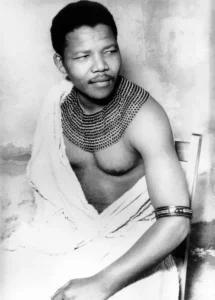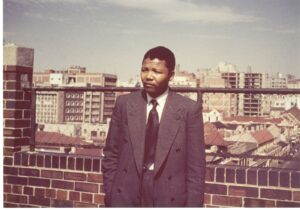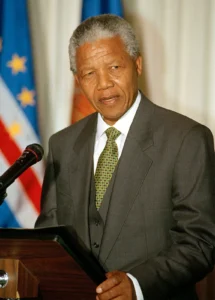Nelson Mandela: A Beacon of Hope and Freedom
Nelson Mandela, a name that resonates with courage, resilience, and the unyielding pursuit of justice. His life, marked by extraordinary struggles, profound wisdom, and unwavering commitment to the ideals of freedom and equality, serves as an inspiration to the world. In this article, we delve into the remarkable journey of Nelson Mandela, from his early life and struggles to his enduring legacy and philosophy that continues to shape the world today.
Early Life: A Glimpse into Humble Beginnings
Nelson Rolihlahla Mandela was born on July 18, 1918, in the village of Mvezo, in the Eastern Cape province of South Africa. His birth name, Rolihlahla, means “pulling the branch of a tree” in Xhosa, and it was a name given to him by his father. Mandela would later be affectionately called “Madiba,” which is a traditional clan name.
Mandela’s early years were spent in the small village of Qunu, where he lived with his family in a traditional Thembu royal homestead. His father, Gadla Henry Mphakanyiswa, was a chief, and Mandela was groomed to follow in his footsteps. However, this tranquil rural upbringing would soon give way to the turbulence of a nation grappling with the oppressive forces of apartheid.

Apartheid: The Seeds of Injustice
Apartheid, a system of institutionalized racial segregation, would come to define South Africa during Mandela’s lifetime. This oppressive regime, which lasted from 1948 to 1994, enforced a strict racial hierarchy, with the white minority exercising power and control over the black majority. It was a system built on the foundation of racial discrimination, where segregation was legally mandated, and black South Africans were subjected to pervasive injustices.
Mandela’s first encounter with the injustices of apartheid came during his education. He attended primary school in Qunu and later moved to Clarkebury Boarding Institute and Healdtown, two mission schools with a stronger academic focus. During these years, he became increasingly aware of the racial prejudices that shaped South African society.
Law Studies and the Road to Activism
In 1939, Nelson Mandela enrolled at the University of Fort Hare, one of the few institutions of higher learning available to black South Africans. However, his time there was short-lived as he was expelled for participating in a student protest against the university’s policies. He continued his studies through correspondence courses while working as a night watchman.
In 1943, Mandela moved to Johannesburg, a city that would play a pivotal role in his life. He found employment as a law clerk at a firm run by a liberal-minded white South African, which exposed him to a more cosmopolitan and racially diverse environment. This experience was transformative, as it deepened his understanding of racial injustice and the need for change.

Joining the ANC: A Beacon of Hope
Mandela’s involvement in the struggle against apartheid began in earnest when he joined the African National Congress (ANC) in 1943. The ANC, founded in 1912, was the leading anti-apartheid organization in South Africa. It advocated for the rights of black South Africans and sought to end the oppressive policies of apartheid through nonviolent means.
As Mandela became increasingly engaged with the ANC, he also became involved in other activist organizations, such as the Youth League of the ANC. His passion for justice and his unwavering commitment to the cause made him a rising star within the anti-apartheid movement.
Defiance Campaign: The Battle for Equality
The 1940s and 1950s were marked by a series of protests and campaigns against apartheid. One of the most significant of these was the Defiance Campaign, launched in 1952. This campaign called on black South Africans to defy discriminatory laws peacefully and nonviolently. Mandela played a prominent role in the Defiance Campaign, traveling across the country to mobilize support.
One of the defining moments of Mandela’s early activism came during the Defiance Campaign when he was chosen as the National Volunteer-in-Chief. This role saw him leading volunteers in acts of civil disobedience, including the famous bus boycotts in Johannesburg.
The Rivonia Trial: Sacrifice for Freedom
As the struggle against apartheid intensified, so did the government’s efforts to suppress dissent. In 1961, the ANC adopted a more militant approach to resistance, forming an armed wing called Umkhonto we Sizwe, meaning “Spear of the Nation.” Mandela was a key figure in this decision, believing that peaceful protest alone could no longer challenge the entrenched apartheid regime.
In 1961, Umkhonto we Sizwe carried out its first acts of sabotage against government installations. This marked the beginning of an armed struggle against apartheid, with Mandela as one of its leaders. However, the government responded with a fierce crackdown on the ANC and its members.
The turning point in Mandela’s life came on August 5, 1962, when he was arrested and subsequently sentenced to five years in prison for incitement and leaving the country without a passport. Little did he know that this was just the beginning of his long and arduous journey.
In 1964, while still serving his sentence, Mandela and several other leaders of the anti-apartheid movement were put on trial for their involvement in planning sabotage against the apartheid government. The trial, known as the Rivonia Trial, became a global symbol of resistance to apartheid.
During the trial, Mandela delivered a powerful speech from the dock, stating, “I have cherished the ideal of a democratic and free society in which all persons live together in harmony and with equal opportunities. It is an ideal which I hope to live for and to achieve. But if needs be, it is an ideal for which I am prepared to die.” These words resonated with people around the world and symbolized Mandela’s unwavering commitment to the struggle for freedom.
27 Years of Imprisonment: The Making of a Legend
Mandela and his co-accused were found guilty, and on June 12, 1964, they were sentenced to life imprisonment. Mandela was sent to Robben Island, a harsh and isolated prison off the coast of Cape Town. He would spend 27 years behind bars, making him one of the world’s most famous political prisoners.
Life on Robben Island was grueling, with hard labor and inhumane conditions. Mandela and his fellow inmates endured forced labor in a limestone quarry, meager rations, and frequent harassment by prison authorities. However, they also used their time in prison to continue the struggle against apartheid.
Mandela’s leadership qualities shone even in the darkest of times. He organized educational and cultural activities for his fellow inmates, fostering a sense of unity and purpose. He also engaged in secret communications with the outside world, keeping the international spotlight on the anti-apartheid struggle.
Global Solidarity: The World Rallies Behind Mandela
While imprisoned, Mandela became a global symbol of resistance to apartheid. His plight garnered international attention and led to a worldwide campaign for his release. Artists, activists, politicians, and ordinary people from all walks of life called for his freedom.
The international anti-apartheid movement applied pressure on the South African government through boycotts, sanctions, and protests. The call for Mandela’s release echoed from the United Nations to college campuses to the stages of rock concerts.
The Fall of Apartheid: A Triumph of Hope
The end of apartheid seemed like an elusive dream for many years, but the tides of change were slowly turning. South Africa was increasingly isolated on the world stage, and the government faced mounting pressure to end its discriminatory policies.
In the late 1980s, President F.W. de Klerk, who had succeeded P.W. Botha, took steps towards reform. He unbanned the ANC and other anti-apartheid organizations, signaling a willingness to negotiate with the black majority. This was a pivotal moment in South Africa’s history.
Negotiations between the government and the ANC began, and Mandela was released from prison on February 11, 1990, after 27 years of incarceration. His release was met with jubilation, both in South Africa and around the world. The world watched in awe as Mandela, the embodiment of resilience and hope, walked out of Victor Verster Prison.
Mandela’s Presidency: A Beacon of Reconciliation
Nelson Mandela’s release marked the beginning of a new era for South Africa. He quickly assumed a leadership role in the negotiations to end apartheid and transition to majority rule. These negotiations culminated in South Africa’s first multiracial democratic elections in 1994.
On April 27, 1994, South Africans of all races went to the polls in an election that was a celebration of freedom and democracy. The ANC, led by Nelson Mandela, won a landslide victory, and Mandela was inaugurated as the country’s first black president on May 10, 1994. His presidency was a turning point in South Africa’s history, symbolizing a commitment to reconciliation and healing.
Mandela’s approach to leadership during his presidency was characterized by inclusivity and forgiveness. He recognized the need to bridge the deep divides created by apartheid and sought to build a united nation. One of his most remarkable acts was the establishment of the Truth and Reconciliation Commission, which allowed victims and perpetrators of apartheid-era atrocities to come forward and share their stories.
Mandela’s presidency was also marked by a commitment to social justice and economic reform. He implemented policies aimed at addressing the deep inequalities that had plagued South Africa for generations. His government worked to provide access to education, healthcare, and housing for all South Africans.

The Legacy of Nelson Mandela: A Global Icon
Nelson Mandela’s presidency ended in 1999, but his influence continued to shape South Africa and the world. His commitment to peace, reconciliation, and justice made him a global icon of moral leadership.
One of the most enduring aspects of Mandela’s legacy is his philosophy of forgiveness and reconciliation. He once said, “As I walked out the door toward the gate that would lead to my freedom, I knew if I didn’t leave my bitterness and hatred behind, I’d still be in prison.” This philosophy of forgiveness helped South Africa transition from a deeply divided nation to a symbol of hope for the world.
Mandela’s legacy also extends to his dedication to education. He believed that education was the most powerful weapon one could use to change the world. The Nelson Mandela Foundation continues his work by promoting education, dialogue, and social justice.
Lessons from Mandela’s Life and Philosophy
Nelson Mandela’s life and philosophy offer valuable lessons for individuals and societies facing adversity and injustice.
1. Courage in the Face of Adversity: Mandela’s willingness to sacrifice his freedom for the greater good demonstrates the power of unwavering commitment and courage.
2. The Strength of Forgiveness: Mandela’s ability to forgive his oppressors and seek reconciliation rather than revenge serves as a powerful reminder of the transformative potential of forgiveness.
3. Persistence and Resilience: Mandela’s journey from prisoner to president shows the importance of resilience and persistence in the face of seemingly insurmountable challenges.
4. The Power of Unity: Mandela’s ability to unite people of diverse backgrounds and beliefs under a common vision of justice and equality highlights the strength of unity in achieving meaningful change.
5. Commitment to Education: Mandela’s belief in the transformative power of education emphasizes the importance of investing in education as a means to empower individuals and communities.
Conclusion: A Legacy of Hope
Nelson Mandela’s life is a testament to the indomitable spirit of the human soul and the power of individuals to effect positive change in the world. His journey from humble beginnings to global icon is a source of inspiration for people of all ages and backgrounds.
Mandela’s enduring legacy reminds us that even in the face of injustice and adversity, there is hope. Hope that through courage, forgiveness, and unwavering commitment to justice, we can create a better world for future generations. As we reflect on the life of Nelson Mandela, we are reminded that the pursuit of freedom, equality, and justice is a noble endeavor that knows no boundaries, and it is a journey that each of us can embark upon in our own way.
Nelson Mandela’s Interview(youtube)- https://www.youtube.com/watch?v=7bNb3kQVxFQ